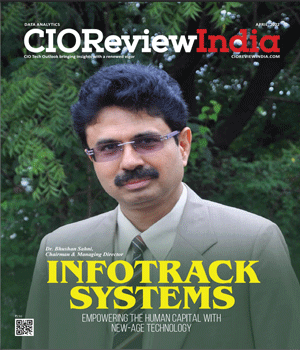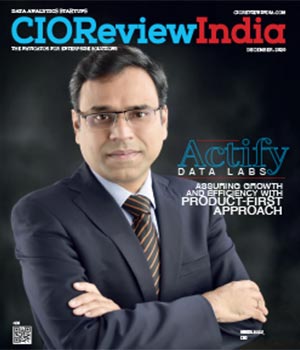
Data Science In BFSI Sector - Importance And Benefits For Entrepreneurs
Alok Bansal, MD and Country Head, Visionet India | Monday, 07 December 2020, 13:32 IST

In handling the myriad problems it faces today, Data Analytics makes the banking industry grow smarter. Although simple reporting and descriptive analytics continue to be a must have for banks, powerful insights are now beginning to be produced by predictive and prescriptive analytics, resulting in substantial value added.
Machine learning is widely used by banks to fuel their businesses, but the use of these emerging technologies is not universal in other departments.
There are technical and operational obstacles on the journey on the systematic application of machine learning to address complex market issues in banking.
In addition, banks today produce immense internal data volumes (customer accounts, credit scoring, purchases, properties, etc.) and now need to consider their external data linkages (interest rates, macroeconomic variables, and customer preferences). The speed of development of this data is also rising exponentially. This is exacerbated by the number of non-traditional or remote touch points, like ATMs, internet, IVR networks, social media and smartphone, which have arisen. The increase in data volume , speed, and variety pushes banks to exploit sophisticated analytics to make sense of the vast and dynamic sources of knowledge and make decisions to remain competitive in near real-time.
Data Science allows businesses to use the data tools available to them, regardless of whether it is consumer data, operational data or anything similar, in a smart manner. It also helps the BFSI sector to enter new customers, cross-sell goods and services across successful distribution networks, improve customer satisfaction, etc.
Data science is ubiquitously applicable to any field of finance, whether it is risk assessment, pricing, advertisement outreach, customer outreach, product creation, expense and revenue distribution.
“Analytics allows the banking sector to become more intelligent in handling the main market issues facing it today”
Analytics allows the banking sector to become more intelligent in handling the main market issues facing it today. Any of the most important fields of which AI / ML is primarily used are:
1. Machine learning for fraud detection is critical for the successful detection and anticipation of illegal activity including credit cards, banking , insurance, etc. Proactive monitoring of bank fraud is important for providing consumers and staff with protection.
2. Customer Experience: The bank has developed a comprehensive consumer service system and has access to both critical customer data and expenditure trends and periods with the aid of data analytics. After that, it analyses what intentions the client has and what credits he doesn't have. This, henceforth, gives the consumers the deals that suit them.
3. Customer Segmentation: Customer segmentation involves defining customer classes that rely on either their behaviour (for behavioural division) or particular characteristics (for example, country, age, income). In Data Science, there is an entire arsenal of techniques such as clustering, decision trees, logistic regression, and they help to learn the Consumer Lifetime Value (CLV) of each system fragment appropriately.
4. Customer Data Collection: Banks are obligated to collect, process and preserve vast volumes of information. But instead of simply looking at it as enforcement practise, AI and data science devices should turn this into an incentive to familiarise themselves with their clients in order to drive new sales opportunities.
5. Risk Modeling :For the financial sector, risk modelling is a high priority. It allows them to devise innovative performance evaluation techniques, one of the most critical facets of credit risk modelling. In major banks around the world, stress testing has already become incorporated and techniques such as SAS, R and Python are also used to verify the bank's financial fitness.
6. Operational efficiency: With such observations, for example, an enterprise can imagine call centre traffic, amounts to be met by teams in back-office work, etc., Artificial Intelligence and Data Science can aid companies with predicting demand based on documented information and potential events by means of propelled time series analytics. It will then be possible to use these perspectives for strategic resourcing, innovative asset allocation and so on.
JP Morgan Chase is supporting the US government by developing resources for policy making using Big Data, according to a recent article. The financial measurements of the United States consolidate the purchases of 30 million American clients. Big data tools can be used to evaluate public information and help decision makers avoid monetary fiascos.
Banks need to understand the critical importance of data analytics in order to achieve competitive advantage, incorporate it into their fundamental decision-making process, implement methods and develop solutions focused on the actionable knowledge of market data.
CIO Viewpoint
Accept Data as an Entity on Balance sheet
By Akshey Gupta, Chief Data Officer, Bandhan Bank
Technology Forecast And Concern In 2020
By Anil Kumar Ranjan, Head IT, Macawber Beekay Private Limited
Data Analytics For Enhanced Productivity And...
By Krishnakumar Madhavan, Head IT, KLA
CXO Insights
Regulatory Implications and Data Protection:...
By Richa Singh
Data-Driven Predictive Technologies
By Pankaj Parimal, Head of Launch & Change Management, Hella Automotive Mexico, S.A. de C.V., Mexico, North America.
5 Mantras That Can Drive Organizations Towards...








.jpg)
.jpg)





